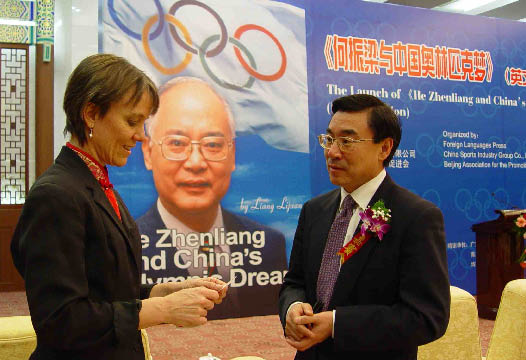| Loanwords
International Norms Will Do
By HUANG YOUYI

Huang Youyi at the launch ceremony of He Zhenliang and China’s Olympic Dream.
RECENTLY a debate has raged in the media concerning how the Chinese language can borrow words from foreign languages while still keeping its integrity and purity. This issue is by no means a new one, and by no means pertinent only to Chinese.
A language, spoken and written, is a means of communication between people. The very word “communication” implies a mutually beneficial flow of information and knowledge between sides, a process that inevitably results in the passage of new ideas on the backs of new words. In the age of information globalization these conceptual stowaways have become ever more evident. However, in the course of exchange and assimilation, the principle applies that the “strong” language loans more than it borrows, and that the converse is true for the “weak” one.
What is a strong language, and what is a weak one? In my view, the most natural criterion is how widely it is used. Logically, Chinese should be the strongest language in the world, since it is spoken and written by the largest number of people and has been in uninterrupted use since its creation by the ancient Chinese thousands of years ago. This last point distinguishes Chinese from languages imposed on or scripts created for native populations by colonialists.
But in fact, international translation organizations classify Chinese as a non-general language, for the simple reason that, though Chinese has more speakers than any other language, its use barely extends beyond China and overseas Chinese communities. For a long time in the past, few foreigners studied Chinese. The reason is equally simple: English speakers find their way around almost the entire world, French speakers cover at least 10 countries in Europe, the Middle East, Africa and Latin America without having to worry about language barriers, and the same holds true for speakers of Spanish. Even speakers of Arabic can travel in some 20 countries without linguistic anxiety. By contrast, Chinese is used only by the Chinese. It is only in recent years that the study of Chinese has become fashionable overseas, powered by China’s rapid economic growth, its higher status in the world, and the more obvious “presence” of the language. It is foreseeable that more and more Chinese terms will become loanwords in other languages.
During the modernization drive of the past century, the Chinese people have incorporated many loanwords into their language. The loanwords are either transliteration, for example jipu (jeep) and tanke (tank), or semantic translation, such as huoche (fire vehicle – train), feiji (flying machine – airplane), and diannao (electronic brain – computer). The outgoing spirit of the Chinese and their eagerness to learn means that more loanwords are sure to flow into their vocabulary via these two methods.
|

